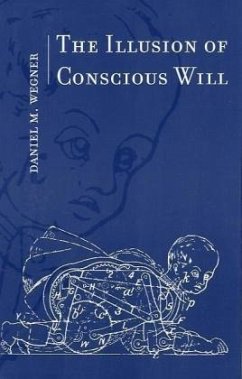A novel contribution to the age-old debate about free will versus determinism.
Do we consciously cause our actions, or do they happen to us? Philosophers, psychologists, neuroscientists, theologians, and lawyers have long debated the existence of free will versus determinism. In this book Daniel Wegner offers a novel understanding of the issue. Like actions, he argues, the feeling of conscious will is created by the mind and brain. Yet if psychological and neural mechanisms are responsible for all human behavior, how could we have conscious will? The feeling of conscious will, Wegner shows, helps us to appreciate and remember our authorship of the things our minds and bodies do. Yes, we feel that we consciously will our actions, Wegner says, but at the same time, our actions happen to us. Although conscious will is an illusion, it serves as a guide to understanding ourselves and to developing a sense of responsibility and morality.
Approaching conscious will as a topic of psychological study, Wegner examines the issue from a variety of angles. He looks at illusions of the will?-those cases where people feel that they are willing an act that they are not doing or, conversely, are not willing an act that they in fact are doing. He explores conscious will in hypnosis, Ouija board spelling, automatic writing, and facilitated communication, as well as in such phenomena as spirit possession, dissociative identity disorder, and trance channeling. The result is a book that sidesteps endless debates to focus, more fruitfully, on the impact on our lives of the illusion of conscious will.
Review text:
'Wegner is a terrific writer, sharing his encyclopedic purchase on the material in amusing, entertaining, and masterful ways.'
-- David Brizer, M.D., Psychiatric Services
'Fascinating. This volume will appeal to a wide general audience as well as to those in the neurosciences....'
-- Herbert Silverman, Science Books Films
'A remarkable demonstration of how psychology can sometimes transform philosophy.'
-- Sue Blackmore, Times Literary Supplement
Do we consciously cause our actions, or do they happen to us? Philosophers, psychologists, neuroscientists, theologians, and lawyers have long debated the existence of free will versus determinism. In this book Daniel Wegner offers a novel understanding of the issue. Like actions, he argues, the feeling of conscious will is created by the mind and brain. Yet if psychological and neural mechanisms are responsible for all human behavior, how could we have conscious will? The feeling of conscious will, Wegner shows, helps us to appreciate and remember our authorship of the things our minds and bodies do. Yes, we feel that we consciously will our actions, Wegner says, but at the same time, our actions happen to us. Although conscious will is an illusion, it serves as a guide to understanding ourselves and to developing a sense of responsibility and morality.
Approaching conscious will as a topic of psychological study, Wegner examines the issue from a variety of angles. He looks at illusions of the will?-those cases where people feel that they are willing an act that they are not doing or, conversely, are not willing an act that they in fact are doing. He explores conscious will in hypnosis, Ouija board spelling, automatic writing, and facilitated communication, as well as in such phenomena as spirit possession, dissociative identity disorder, and trance channeling. The result is a book that sidesteps endless debates to focus, more fruitfully, on the impact on our lives of the illusion of conscious will.
Review text:
'Wegner is a terrific writer, sharing his encyclopedic purchase on the material in amusing, entertaining, and masterful ways.'
-- David Brizer, M.D., Psychiatric Services
'Fascinating. This volume will appeal to a wide general audience as well as to those in the neurosciences....'
-- Herbert Silverman, Science Books Films
'A remarkable demonstration of how psychology can sometimes transform philosophy.'
-- Sue Blackmore, Times Literary Supplement

